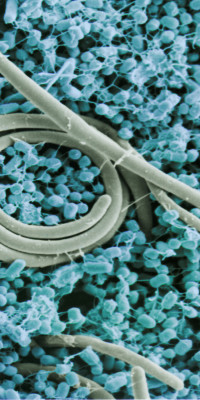Salmonella enterica is a rod-shaped, flagellated, Gram-negative bacterium and a member of the genus Salmonella. It is considered a serious human pathogen and the main cause of food-borne infection in humans. Most infections are caused by food infected with S. enterica, which often infects cattle and poultry produced for consumption.
Transmission:
Commercially produced meat and poultry are the most prominent sources of Salmonella outbreaks in developed nations. Raw chicken eggs and goose eggs can also harbor S. enterica. Pasteurizing and food irradiation are used to kill Salmonella for commercially produced foodstuffs containing raw eggs such as ice cream. Careful preparation and thorough help prevent infection.
Symptoms:
The primary symptom of Salmonella infection is gastroenteritis or a distressing of the gastrointestinal tract. These symptoms may be extremely unpleasant but are not considered dangerous until they progress to advanced dehydration. These include:
- Fever
- Nausea
- Vomiting
- Diarrhea
- Abdominal discomfort


